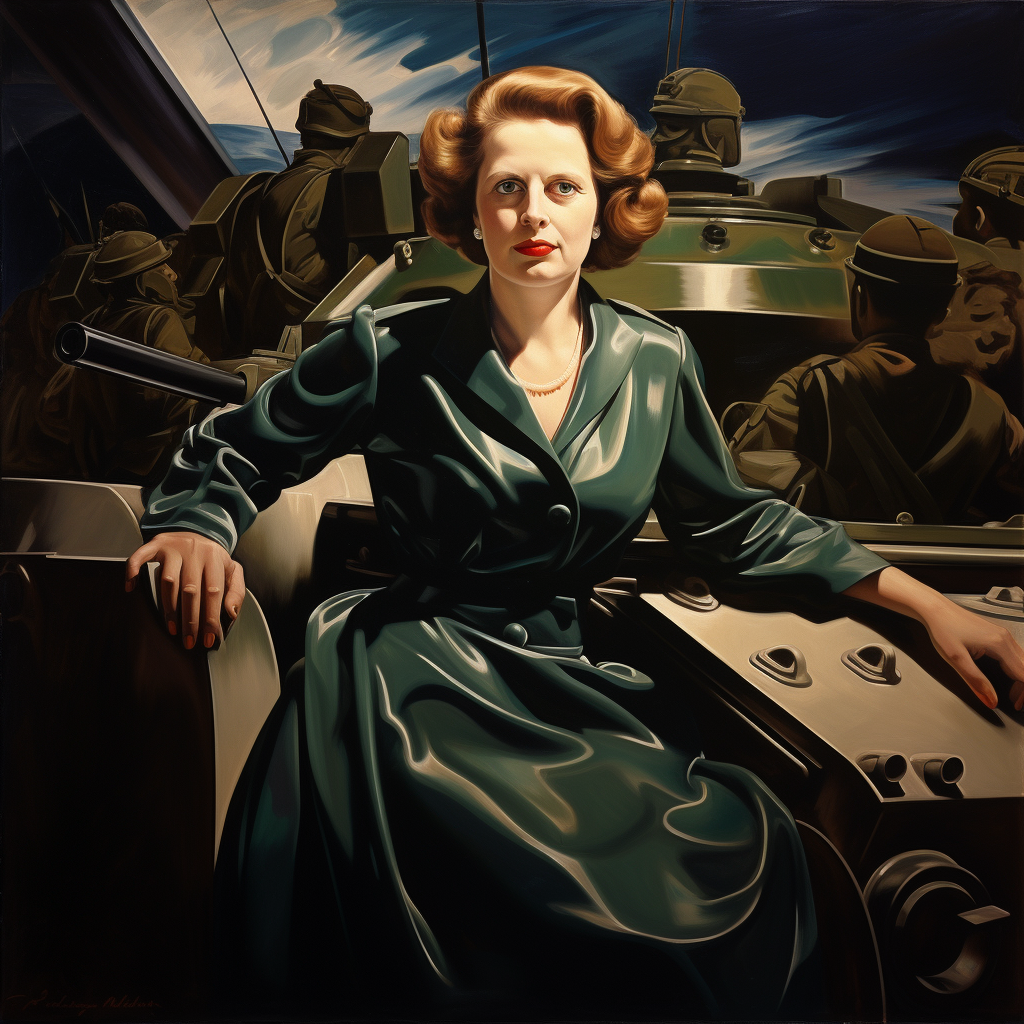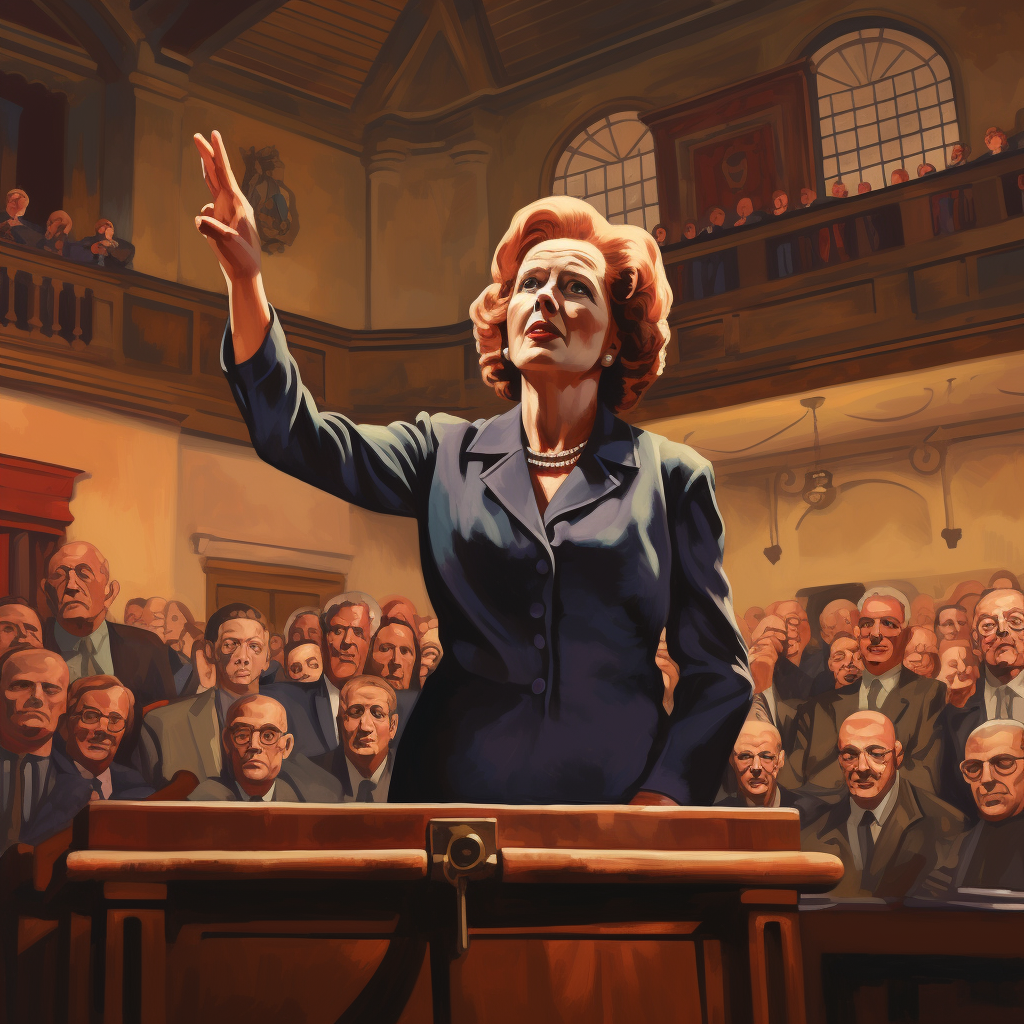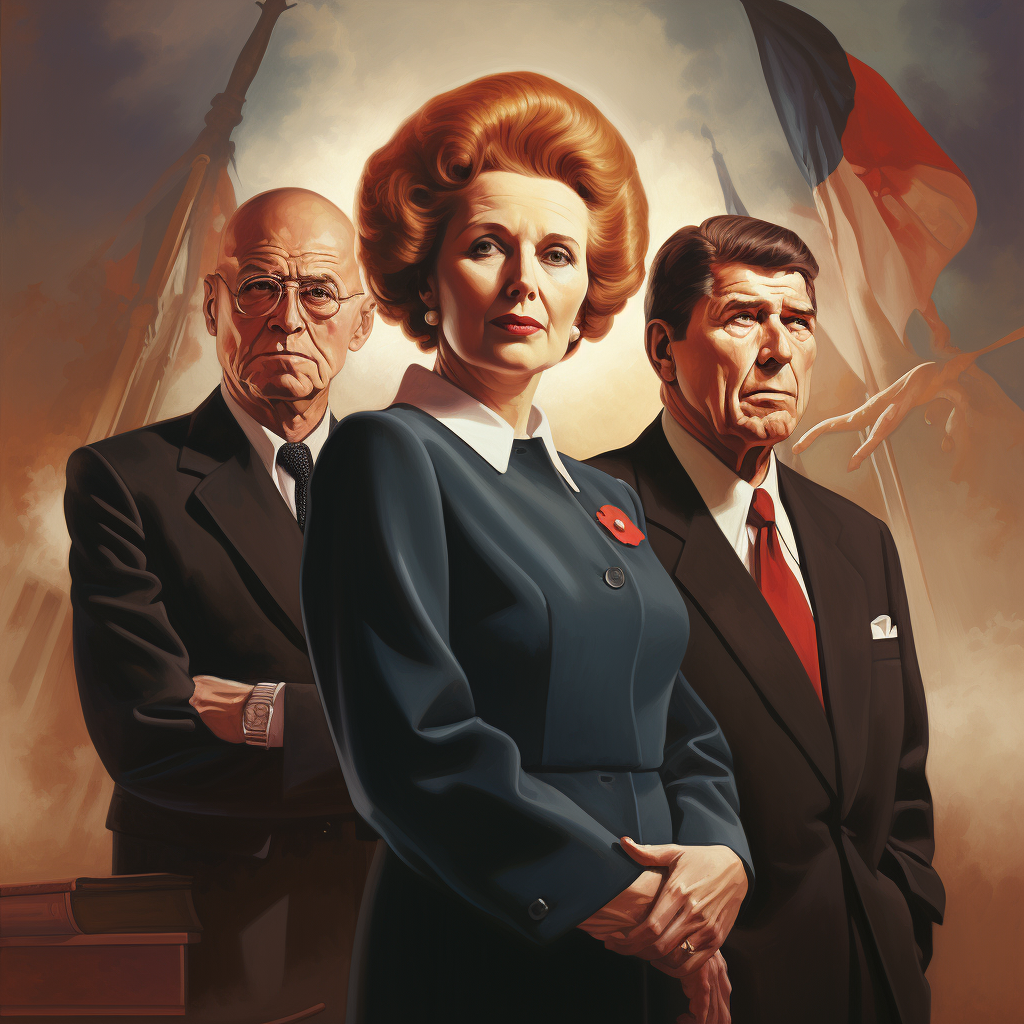PROFILE - Margaret Thatcher Leadership Style

Margaret Hilda Thatcher, known as the “Iron Lady,” was a figure who shaped British politics in the 20th century as the first female Prime Minister of the United Kingdom. Her assertive leadership style, controversial policies, and uncompromising approach to governance left an indelible mark on the country.
This profile post takes an in-depth look at her rise to power, her tenure, and the enduring impact of her leadership on British politics and society, while addressing the question: was Margaret Thatcher a good leader?
Key Takeaways
- Margaret Thatcher was the first female Prime Minister of the UK, earning her nickname “Iron Lady” for her uncompromising commitment to principles.
- Her leadership during the Falklands War and economic reforms demonstrated determination in face of opposition, while poll tax controversy led to resignation.
- Legacy includes transformation of Britain's economy, reassertion of British sovereignty and gender barrier breaking influence on future generations.
Margaret Thatcher's Rise to Power

Born Margaret Hilda Roberts on October 13, 1925, in Grantham, eastern England, she initiated a political path that led her to shatter gender barriers and redefine British politics as the Iron Lady. Her relentless spirit and determination moved her from modest beginnings to the highest echelons of power, becoming the first female Prime Minister of the United Kingdom in 1979.
Early in her political career, Thatcher achieved the following milestones:
- Elected as a Member of Parliament for Finchley in 1959
- Appointed as Education Secretary in 1970
- Made history by becoming the first woman to lead the Conservative Party in 1975
- Elected as British Prime Minister in 1979
Her assertive and straightforward leadership style defined her tenure and influenced British politics for decades to come.
Early Political Career
Margaret Thatcher’s initial foray into politics began at Oxford University, where she served as the President of the Oxford University Conservative Association. After earning a degree in chemistry, she entered the political arena as a Member of Parliament for Finchley in 1959. Her career quickly gained momentum, and she was elevated to the front bench as Parliamentary Secretary to the Ministry for Pensions in 1961.
As Education Secretary under Prime Minister Edward Heath in the Conservative government, Thatcher faced her first major controversy when she ended the provision of free milk to school children aged 7 to 11, earning her the nickname “milk snatcher”. Despite the outcry, Thatcher remained steadfast in her convictions and continued to rise within the ranks of the Conservative Party, eventually paving the way for her leadership bid in 1975.
Leader of the Conservative Party
Upon becoming the leader of the Conservative Party, Thatcher aimed for the highest office in the country. Thatcher's leadership was marked by her steadfast dedication to free-market capitalism, strong national defense, and British sovereignty, which defined her tenure as Prime Minister.
In the 1979 general election, Thatcher’s Conservatives emerged victorious, ousting the Labour government led by James Callaghan. As the first woman to hold the office of British Prime Minister, she vowed to bring:
- Harmony
- Truth
- Faith
- Hope
Her resolute approach to achieving political objectives, a key trait of her leadership, influenced British politics throughout the 1980s and beyond, including during the tenure of John Major as Prime Minister.
During her three consecutive terms as Prime Minister, Thatcher faced numerous challenges, both at home and on the international stage. Her steadfast commitment to her principles and her capacity to make difficult decisions despite adversity earned her the nickname “Iron Lady”.
The Falklands War: A Display of Resolve

One of the defining moments of Margaret Thatcher’s leadership came in 1982 when Argentina invaded the Falkland Islands, a British territory. Despite the risks and opposition from some of her advisers, Thatcher made the bold decision to dispatch a Task Force to reclaim the islands, a move that significantly impacted her foreign affairs. Her decisive response to the crisis demonstrated her determination and leadership amid international conflict.
The strategic considerations behind Thatcher’s decision to retake the Falklands included asserting British sovereignty, protecting the interests of the islanders, and demonstrating resolve in the face of aggression. The successful military action reinforced her reputation for courage and increased her popularity at home, as the British public supported her leadership during this crisis.
The Falklands War also left a lasting imprint on international relations, with Margaret Thatcher’s firm determination standing as a robust example of leadership during conflict. Her handling of the crisis would go on to shape her legacy as one of the most influential and decisive leaders in British history.
Economic Reforms :the Miner's Strike and Trade Unions

Thatcher’s time as Prime Minister was characterized by a series of economic reforms intended to rejuvenate the stagnant British economy. Her policies, which came to be known as “Thatcherism,” focused on deregulation, privatization of state-owned companies, and diminishing the power and influence of trade unions within the framework of the Conservative government.
One of the most contentious episodes during Thatcher’s time in office was the miner’s strike in 1984-1985. The strike, led by the National Union of Mineworkers, was a response to the government’s plans to close unprofitable coal mines and reduce state subsidies to the industry. Thatcher stood firm in the face of fierce opposition and refused to yield to the trade unions demands, eventually leading to the strike’s collapse and the decline of trade union influence in Britain.
Though initially met with disapproval and sparking protests and criticisms, Thatcher’s economic policies eventually led to a decline in inflation and an improvement in the economy. Her unwavering commitment to these reforms, even in the face of significant opposition, highlighted her strong leadership and determination to see her vision for Britain realized.
The Controversial Poll Tax
Another contentious policy introduced by Thatcher was the poll tax, formally referred to as the Community Charge. This new method of paying for local government was intended to ensure that all paid for local services and to make local council finance more equitable and transparent.
However, the poll tax quickly became deeply unpopular, as it imposed a flat amount on each person, disproportionately affecting the most disadvantaged and financially burdened citizens.
Public protests and widespread opposition eventually led to the reversal of the poll tax, a rare instance of Thatcher backing down on a policy. The controversy over the poll tax significantly contributed to her eventual resignation as Prime Minister, demonstrating the difficulties of implementing unpopular policies, even for a determined leader like Thatcher.
Despite the setbacks caused by the poll tax, Thatcher's legacy includes:
- Standing firm on her convictions
- Pushing for transformative policies
- Her unwavering commitment to her principles, even in the face of significant opposition
- Her strong leadership and determination to see her vision for Britain realized
These aspects of her tenure as the longest serving prime minister remain influential.
Cold War Leadership and International Relations

Thatcher played a decisive role in shaping international relations during the Cold War era. Her contributions include:
- Building a strong bond with US President Ronald Reagan
- Supporting his anti-Communist policies
- Reinforcing the Western alliance against the Soviet Union
- Challenging the Communist policies of the Soviet Union
- Ushering in a new era of global politics
In addition to her partnership with Ronald Reagan, Thatcher also played a significant role in the peaceful resolution of the Cold War through her relationship with Soviet leader Mikhail Gorbachev. Recognizing the potential for change in the Soviet Union, she helped to facilitate dialogue between Gorbachev and the West, ultimately contributing to the end of the Cold War.
Thatcher's leadership throughout this turbulent period in world history demonstrated her capacity to manage intricate international relationships while upholding a strong commitment to her principles and beliefs. Her influence on international relations during the Cold War era remains an important aspect of her legacy as a world leader.
Thatcherism and its Impact on British Politics
Thatcherism, the comprehensive and determined reform of the post-war consensus, characterized Margaret Thatcher's tenure as Prime Minister. This political philosophy challenged the prevailing Keynesianism, welfare state, nationalized industry, and high taxes that dominated British politics in the post-war era. Thatcherism's principal tenets and measures included:
- Free-market capitalism
- Deregulation
- Privatization
- A reduced role for the state in the economy
Thatcher's steadfast commitment to her principles and policies left a lasting imprint on the Conservative Party and British politics overall. Many of the core principles of Thatcherism continue to shape the ideology and policies of the modern Conservative Party, reflecting the enduring influence of her leadership.
The legacy of Thatcherism remains a subject of debate and controversy in politics. While some view her policies as necessary for reviving the stagnant economy and promoting competition, others argue that her reforms led to increased inequality and social unrest.
Regardless of one's perspective, it is undeniable that Thatcherism and Margaret Thatcher's leadership left an indelible mark on the political landscape of the United Kingdom.
Privatization of State Industries
A critical aspect of Thatcher's economic reforms was the privatization of state-owned industries. As a staunch believer in free-market capitalism, she sought to reduce the power of the state and increase the power of the people by transferring ownership of these industries to private hands.
Key milestones of the privatization process under Thatcher's government included the sale of British Telecom, British Gas, and British Airways, among others. These policies aimed to revive the stagnant economy, promote competition in the market, and ultimately create a more prosperous and dynamic United Kingdom.
European Integration and British Sovereignty
Throughout her tenure, Margaret Thatcher maintained a strong skepticism of European integration, often giving priority to the defense of British sovereignty over fostering closer ties with the European Union. Her opposition to full European integration, including the replacement of the pound sterling with the euro, reflected her strong commitment to maintaining Britain's independence in the face of increasing European integration.
Thatcher's doubts about European integration came to the fore during her third term as Prime Minister, when she delivered a speech at Bruges in 1988 that started to shift her party towards a more ‘Euro-sceptic' ideology. Her concerns about the potential loss of British sovereignty and the negative effects of European integration on the UK's economy and political autonomy would continue to shape the Conservative Party's approach to the European Union in the years to come.
Margaret Thatcher's skepticism of European integration and her stance on defending British sovereignty remain integral to her political legacy and continue to shape the debate on the United Kingdom's relationship with Europe. Her unwavering commitment to maintaining Britain's independence in the face of increasing European integration is a testament to her strong leadership and determination to protect the interests of her country.
Resignation as Prime Minister and Legacy
The circumstances leading to Margaret Thatcher’s resignation as Prime Minister were a combination of:
- Internal party strife
- Growing public dissatisfaction with her policies, most notably the poll tax
- A leadership challenge by backbench MP Sir Anthony Meyer in 1989, which exposed divisions within the Conservative Party
- Her contentious temperament and inclination to override collective opinion, which added to the dissatisfaction among her colleagues
Despite her eventual resignation, Margaret Thatcher left a lasting legacy in British politics. Her tenure as Prime Minister saw:
- The transformation of Britain’s economy
- The reassertion of British sovereignty in the Falklands War
- A lasting impact on international relations during the Cold War era
Denis Thatcher, her husband, played a significant role in supporting her political career, providing both emotional and financial backing.
As the first female Prime Minister of the United Kingdom, she broke gender barriers and inspired future generations of women to enter politics.
Margaret Thatcher’s leadership, marked by assertiveness, directness, and steadfast commitment to her principles, continues to shape modern political discourse and people’s understanding of leadership. Her impact on British politics and society remains a subject of debate, with her policies and actions continuing to shape the nation long after her time in office.
Leadership Style and Personal Qualities
Margaret Thatcher’s leadership style was characterized by her assertiveness and directness, traits that earned her the nickname “Iron Lady” from a Soviet journalist. As an autocratic leader, she was unafraid to make difficult decisions and stick to her convictions, even in the face of significant opposition or controversy. While this approach could sometimes cause dissatisfaction among her colleagues, it also enabled her to effectively navigate high-pressure situations and achieve her political objectives.
Thatcher’s resolute approach to leadership was also evident in her ethical outlook. She was a staunch believer in absolutism, nationalism, and liberal individualism, principles that informed her political philosophy and the policies she implemented during her time in office. Her steadfast commitment to these principles helped influence the direction of British politics throughout her tenure and beyond.
The leadership style and personal qualities of Margaret Thatcher remain influential in modern political discourse, as her legacy continues to shape the way people think about leadership and the role of government. Whether one views her policies as necessary for revitalizing the British economy or as a source of increased inequality and social unrest, her impact on politics and society is undeniable.
In conclusion, Margaret Thatcher’s tenure as Prime Minister was marked by her assertive leadership, transformative policies, and unwavering commitment to her principles. From her rise to power as Britain’s first woman Prime Minister to her enduring legacy in politics, her impact on the nation and its place in the world remains a subject of debate and admiration. As the Iron Lady, Margaret Thatcher demonstrated that strong leadership and determination can shape a country’s destiny, leaving an indelible mark on history.
Frequently Asked Questions
What did Margaret Thatcher do that was so great?
Margaret Thatcher was the first female British prime minister and the longest-serving of the 20th century, leading the country for almost 12 years. She became famous for her uncompromising politics and leadership style, implementing economic policies known as Thatcherism that made a lasting impact on the UK's economy.
Did Queen Elizabeth like Margaret Thatcher?
Queen Elizabeth did not appreciate Margaret Thatcher's attempt to protect her, finding her deference excessive and her tone both ingratiating and high-handed.
What was the cause of death for Margaret Thatcher?
Baroness Thatcher passed away on 8 April 2013 due to a stroke suffered at the Ritz Hotel in Piccadilly.
What was Margaret Thatcher's response to the Falklands War?
Margaret Thatcher showed strong leadership by ordering a successful military action to reestablish British sovereignty over the Falkland Islands.
What was the main focus of Thatcher's economic policies?
Margaret Thatcher's economic policies, known as Thatcherism, concentrated on loosening governmental control over businesses, encouraging privatization of state-owned enterprises and weakening the influence of trade unions.



